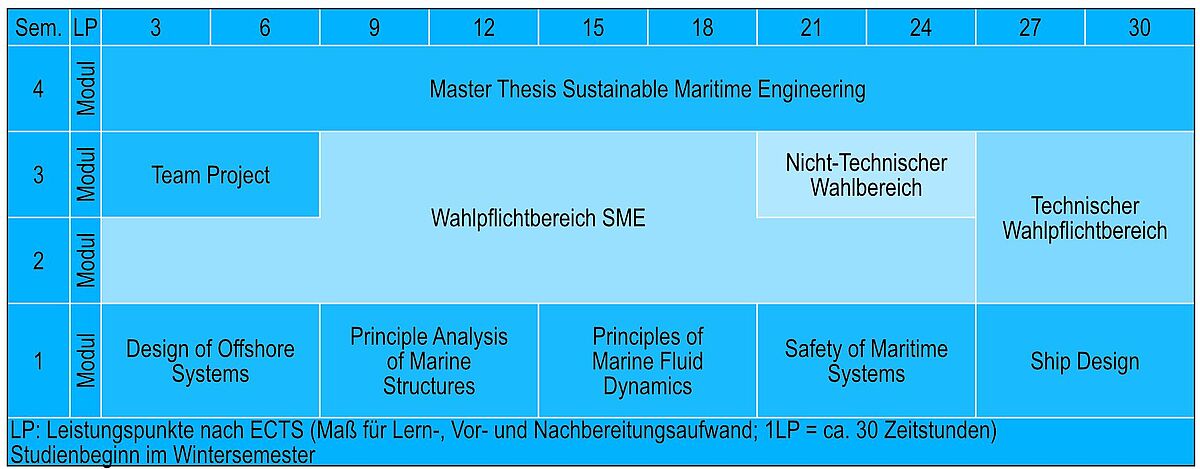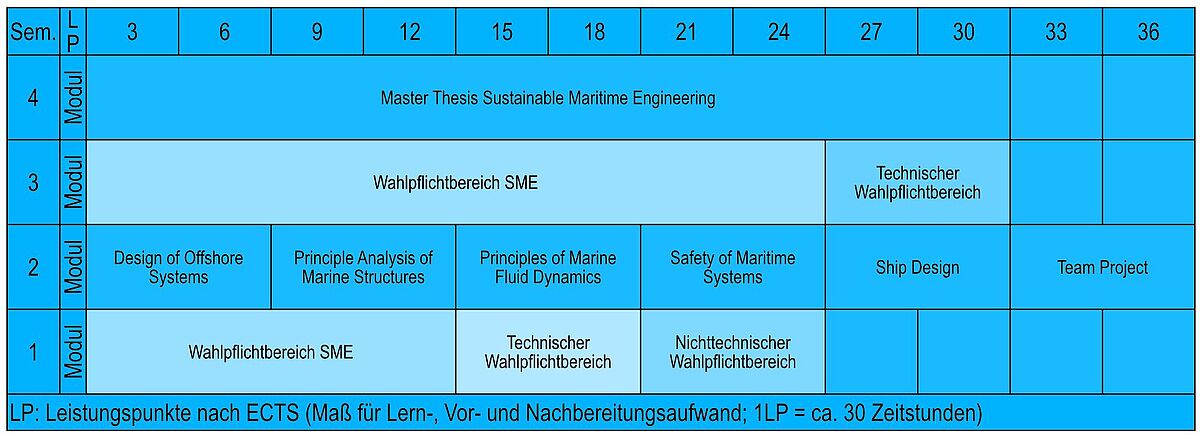How can we sustainably use our oceans? The international Master’s program in Sustainable Maritime Engineering addresses this critical question by combining engineering with the challenges of sustainability. Whether focusing on low-emission shipping, intelligent underwater robotics, or renewable energy generation from the oceans, the program provides the knowledge to develop innovative solutions for a sustainable maritime future.
The program is designed for individuals passionate about the ocean and future technologies, with a strong interest in environmental issues and sustainability. Creativity, desire for international collaboration, and a love for technology are ideal prerequisites.
Students must first complete a Bachelor’s degree in engineering, such as mechanical engineering (duration typically 3 years). The subsequent Master’s program spans 2 years, offering a combination of mandatory and elective courses with practice-oriented teaching methods. In addition to a comprehensive foundation in engineering, students can choose from three specializations:
- Naval Architecture: Design of modern, low-emission ships
- Ocean Engineering: Development of technical systems for marine applications, such as renewable energy generation.
- Underwater Technologies: Intelligent systems and robotics for underwater applications, including deep-sea exploration.
The program emphasizes teamwork in international settings and the application of theoretical knowledge to real-world projects. Field trips, laboratory work, and access to modern research infrastructures, such as the research vessel Limanda, enhance practical learning.
Through partnerships with the Ocean Technology Campus, Fraunhofer, and the Leibniz Institute for Baltic Sea Research Warnemünde, the program offers unique opportunities. Students gain access to cutting-edge research facilities and practical projects, such as the artificial reef at Nienhagen. The program’s strong international focus, including a double-degree option with other European universities, makes it unique in Germany.
Graduates of the program are highly sought-after professionals equipped to shape the future of the maritime industry. They are qualified to work in various sectors, including shipbuilding, marine engineering, energy production, and environmental technologies, in companies, research institutions, international organizations or academia.
Bachelor qualifying for a profession in the subject of Engineering, with a minimum of 180 credit points/ECTS, or a similar degree.
► Zugangsvoraussetzungen für Masterstudiengänge an der Universität Rostock
The following subject-specific admission requirements must also be met for the Sustainable Maritime Engineering degree programme:
1. Applicants have to prove English language skills on level B2 according to the Common European Framework of Reference for Languages. The acquisition of a general higher education entrance qualification in Germany is recognised as proof of sufficient English language skills.
2. Proof of in-depth knowledge in the following subject areas must be provided:
- Mathematics (at least 15 CP)
- Technical mechanics (at least 10 CP)
- Fluid mechanics/hydrodynamics (at least 5 CP)
An admission will only be given if a successful graduation from the Master's course of study can be expected. Therefore, we accept only candidates who have completed their first university degree with at least 75% of the CGPA (cumulative grade point average) or with a comparable grade in a different grading system. Alternatively, a GATE (Graduate Aptitude Test in Engineering) with a minimum score of 500 is accepted.
The binding admission requirements are governed by the degree programme-specific examination and study regulations (SPSO) → see section “Formalities / Regulations /Downloads”
There are no admission restrictions for the Sustainable Maritime Engineering (M.Sc.) degree programme. All prospective students who fulfil the admission requirements can enrol directly. Prior application is not required. The programme can only be started in the winter semester/winter and summer semesters in the first semester. Enrolment in a higher semester (e.g. for university transfer students) is possible in the winter and summer semesters.
► To online enrolment for the first semester
► To enrol for a higher semester
Regardless of whether there is an admission restriction, prospective international students must always apply separately.
International applicants must provide proof of the above-mentioned admission requirements. Furthermore, no knowledge of German is required for the Sustainable Maritime Engineering (M.Sc.) degree programme.
Brochures
Framework Examination Regulations (RPO)
The general rules of study in Bachelor's and Master's degree programs at the University of Rostock are determined by the
► Framework Examination Regulations (Bachelor/Master) in the currently valid version.
Specific Examination and study Regulations
The detailed rules for the study of a specific study program, are then regulated in the respective program-specific examination and study regulations (SPSO). When entering a higher subject semester, older versions of the SPSO may apply (see history).
M.Sc. Sustainable Maritime Engineering
(früher: M.Sc. Schiffs- und Meerestechnik)
aktuell gültig für Neuimmatrikulationen zum 1. Fachsemester:
► 1. Änderungssatzung (2025) → Nicht amtliche Lesefassung → Nicht amtliche englische Lesefassung
Universität Rostock
Faculty of Mechanical Engineering and Marine Technologies
Departmental student advisory service of the faculty
Prof. Dr.-Ing. Florian Sprenger
fon: +49 381-498 9270
florian.sprengeruni-rostockde
Adress:
Albert-Einstein-Str. 2, Raum 216, 18059 Rostock
consultation hours after arrangement
Study Office of the Faculty of Mechanical Engineering and Marine Technologies
fon: +49 381 498-9004/5
studienbuero.mbstuni-rostockde
Adress: Raum 109/110
Albert-Einstein-Straße 2 | 18059 Rostock
More information at the faculty website:
For general questions about studying at the University of Rostock:
fon: +49 381-498 1230
studiumuni-rostockde




